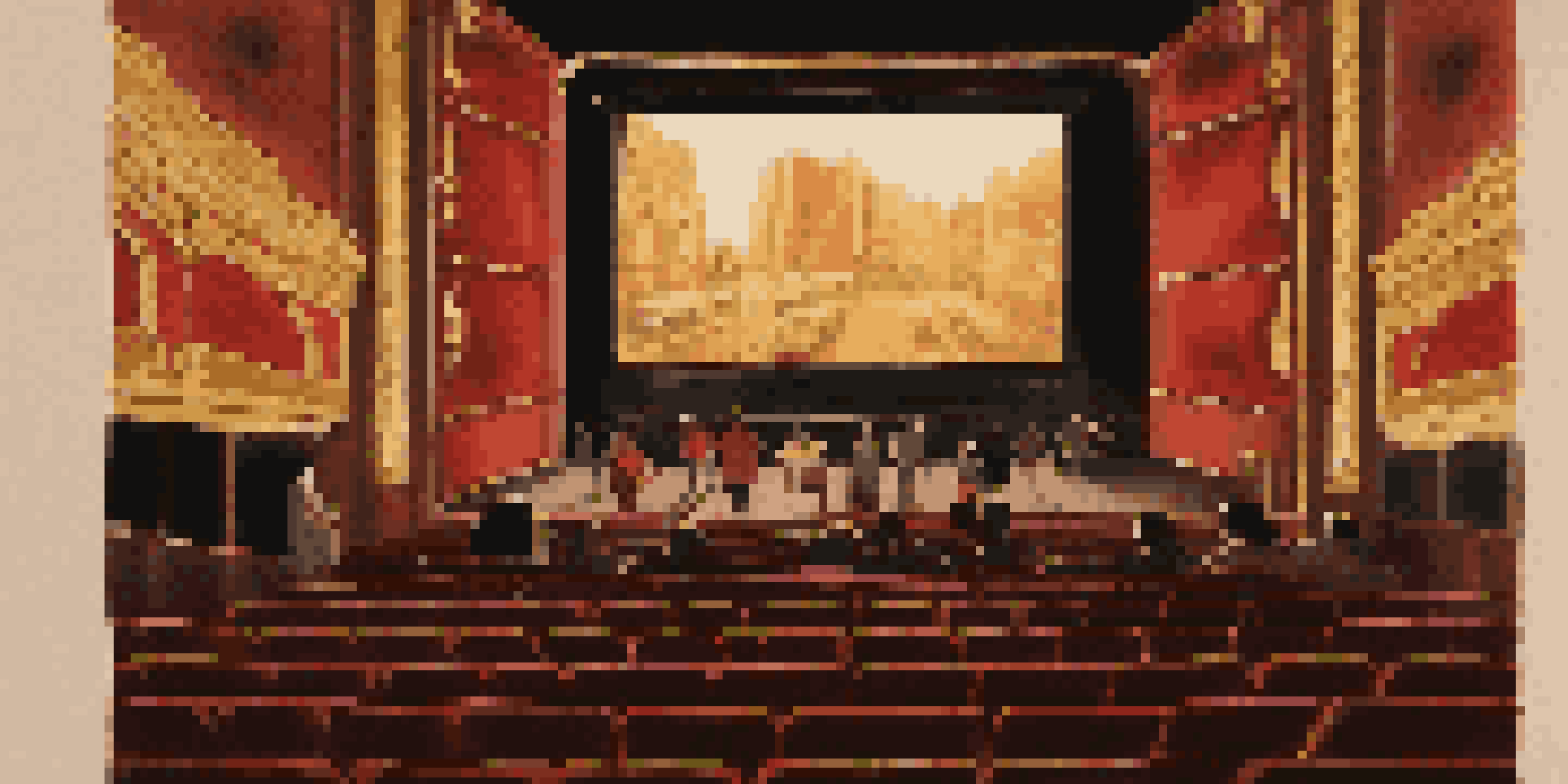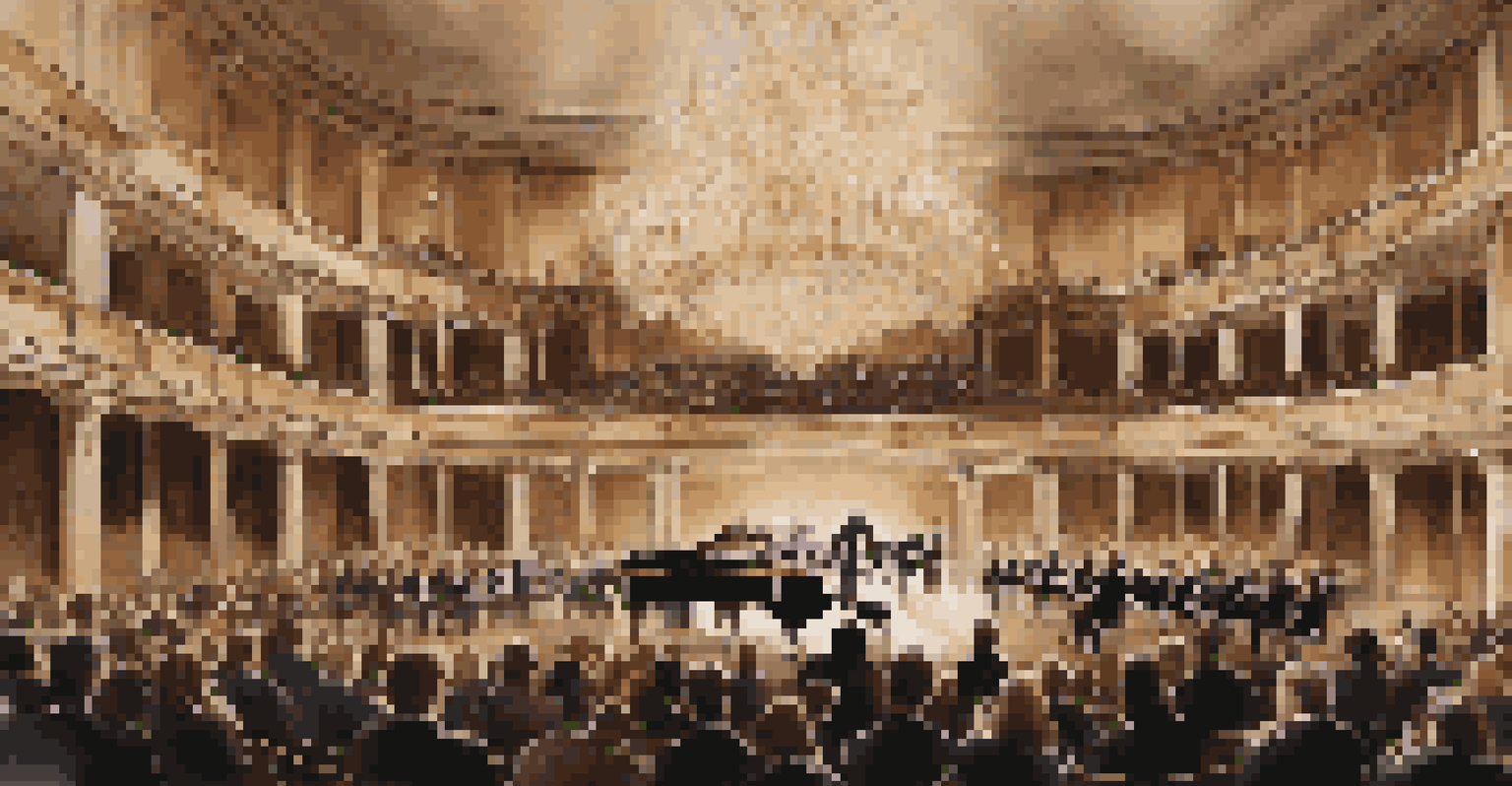Cinematic Soundscapes: Music's Role in Movie Nostalgia

The Power of Music in Film: An Emotional Anchor
Music has an incredible ability to evoke emotions, and in film, it acts as a powerful anchor for viewers. Think back to a scene in your favorite movie—chances are, the accompanying score still resonates with you, enhancing the visuals. By carefully selecting musical themes, filmmakers create an emotional landscape that influences how we perceive characters and events.
Music can change the world because it can change people.
This emotional connection often lingers long after the credits roll. For instance, the iconic theme of 'Star Wars' or the haunting melodies from 'The Titanic' not only heighten the viewing experience but also etch those moments into our memories. It’s almost like a time capsule that transports us back to our first encounter with the film.
As we reminisce about these cinematic experiences, the music often plays a starring role in rekindling our feelings. This phenomenon is why soundtracks become beloved relics—because they remind us of those profound moments in time.
Nostalgia Defined: A Journey through Sound
Nostalgia is a complex emotion that combines both a longing for the past and a sense of warmth associated with those memories. In films, music acts as a catalyst, triggering those nostalgic feelings by reminding us of experiences we've had, whether it's a first date or a family gathering. It’s fascinating how a few notes can transport us back to a different era or moment in our lives.

Consider the use of retro tracks in movies like 'Guardians of the Galaxy,' which cleverly taps into the nostalgia for the '70s and '80s. The songs are not just background noise; they are integral to the film’s identity, connecting the audience to both the characters and the time period. This clever integration makes the experience richer and more relatable.
Music as an Emotional Anchor
In film, music enhances emotional experiences, creating lasting connections with audiences.
Ultimately, nostalgia through music in cinema creates a unique bond between the film and its audience. It’s that delightful feeling of remembering where you were when you first heard that song or watched that scene, blending personal memories with cinematic storytelling.
Iconic Scores: Composers Who Define Movie Memory
When we think about cinematic soundscapes, iconic composers like John Williams, Hans Zimmer, and Ennio Morricone come to mind. Their scores have become synonymous with the films they accompany, leaving a lasting imprint on our hearts. For instance, Williams' 'Star Wars' score is not just music; it's a cultural phenomenon that evokes excitement, adventure, and nostalgia for generations.
The only truth is music.
These composers understand how to use motifs and themes to create memorable soundscapes. Zimmer’s work in 'Inception' and 'The Lion King' showcases his ability to convey complex emotions through music. By crafting recognizable themes, they ensure that the music becomes a part of the film's identity, making it unforgettable.
The magic happens when these scores are played outside of the movie context. Suddenly, a few notes can evoke vivid memories of epic battles, heart-wrenching moments, or joyful reunions, allowing us to relive those cinematic experiences in our minds.
Songs That Shape Our Cinema Experience
Alongside scores, popular songs in films can create powerful associations that resonate with audiences. Think of classic movie moments like 'I Will Always Love You' during 'The Bodyguard' or 'Don't You (Forget About Me)' from 'The Breakfast Club.' These songs are not just background; they become integral to the film's storytelling.
By incorporating well-known tracks, filmmakers tap into our collective memories, enhancing the emotional weight of a scene. These songs often resonate deeply, sometimes even overshadowing the film itself, as they become cultural touchstones in their own right.
Nostalgia through Soundtracks
Music triggers nostalgic feelings, linking personal memories with cinematic storytelling.
As we hear these songs again, they transport us back to the emotions we felt while watching the movie, reinforcing the nostalgia associated with that time and place. It’s a beautiful interplay between music and memory, reminding us of how intertwined our experiences can be.
Cinematic Techniques: Crafting Soundscapes
Filmmakers employ various techniques to craft immersive soundscapes that heighten our emotional responses. From the careful selection of sound effects to the layering of music and dialogue, every element plays a role in shaping the viewer's experience. For instance, the use of silence can create tension, while a crescendo can evoke excitement.
Sound design is an art form that requires meticulous attention to detail. Techniques like diegetic and non-diegetic sound help create a seamless blend of what characters hear and what the audience experiences. This layering adds depth to storytelling, making the world feel more real and engaging.
As viewers, we often underestimate the impact of these soundscapes, but they are crucial in guiding our emotions. A well-crafted sound environment can make us feel joy, fear, or nostalgia, proving that sound is just as important as the visuals we see on screen.
Cultural Impact: Music's Role in Film History
The relationship between music and film has shaped cultural landscapes over the years. Iconic soundtracks have influenced fashion, language, and even social movements. For example, the '80s hit 'Eye of the Tiger' from 'Rocky III' became an anthem for perseverance and motivation, transcending the film itself.
This cultural impact underscores the importance of music in cinema, as it often reflects societal values and trends. As films evolve, so do their soundtracks, adapting to the changing tastes and preferences of audiences. Today, we see a resurgence of vinyl and retro sounds, marrying nostalgia with contemporary filmmaking.
Cultural Impact of Film Music
Iconic soundtracks shape cultural trends and reflect societal values, influencing generations.
As we look back at cinematic history, we can see how music has played a vital role in shaping our collective memory. Every era has its signature sound, and those melodies continue to influence new generations of filmmakers and audiences alike.
The Future of Soundscapes in Cinema
As technology continues to evolve, so does the way we experience sound in movies. Innovations in sound design and music production are enhancing our engagement, making us feel as if we are part of the story. With advancements like Dolby Atmos and immersive sound systems, filmmakers can create more dynamic soundscapes that envelop viewers.
Moreover, the rise of streaming platforms has changed how we access film music. Soundtracks are now more readily available, allowing audiences to revisit their favorite scores and songs anytime. This accessibility fosters a deeper connection to the films and the emotions they evoke.

Looking ahead, we can expect soundscapes to become even more integral to storytelling. As filmmakers continue to explore new ways to blend music and sound with visuals, our cinematic experiences will only become richer and more immersive, keeping the nostalgia alive for future generations.